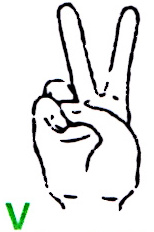V
V or v (spoken: [ faʊ ]) is the 20th letter of the classical and the 22nd letter of the modern Latin alphabet . It's a consonant . The letter V has an average frequency of 0.67% in German texts, making it the 22nd most common letter .

The finger alphabet for the deaf or hard of hearing represents the letter V in the form of the well-known victory symbol .
Origin and use

|

|

|
|

|
| Protosinaitic waw sign |
Phoenician vaw | Greek Ypsilon | Etruscan V | Latin V |
The V shares a large part of its history with the U and W , besides the Y and also the F are related to it.
The sound value and meaning of the letter in the Protosinaitic script are unknown. The corresponding symbol is a hook or a club with a circular top. In the Phoenician alphabet , the letter resembles a rounded Y. The letter was named Waw and was used to represent the sound value [w] (an unsyllabic [u]).
The letter was added to the Greek alphabet as Ypsilon . In early Greek the sound value of the Ypsilon was the vowel [u] corresponding to the [w ].
The Etruscans adopted the early Greek Ypsilon and its sound value. Over time, the lower point disappeared with the Etruscans, the letter got the form V. The meaning of the letter also changed: The Etruscan also contained the half-vowel [w] corresponding to the [u] and the letter was used to denote both sounds write.
The Romans adopted the letter with both sound values. Originally the letter was written in the pointed form adopted by the Etruscans. In late antiquity, a rounded variant was also developed that corresponds to the U in appearance. Both forms were interchangeable. It was not until around the 17th century that the pointed variant of the letter was only used for the consonant sound value and the round one only for the vowel value.
Up to the 5th century , the Roman half-vowel [w] became the fricative [v] in the context of phonetic changes . When, towards the end of the first millennium AD, the Germanic languages that had the sound [w] were written, the characters <v> or <u> were not always considered appropriate and instead the ligature <uu> or . <vv>, from which today's w developed.
In modern High German , the letter v is often used to represent the sound [f]. In Germany this is mainly used for apparently German words, in South German names tend to be more F-sound (examples: Vikar, Viktor, Viper, Ventil, vulgar).
- In Old High German , the sound was usually written with an F: Fihu (cattle), filu (a lot), fior (four), firwizan (to refer), folch (people).
- In Middle High German there are f and v spellings for the same word; however, the v-spelling is preferred for normalized Middle High German: Vrouwe (woman), vriunt (friend), vinden (to find), vuoz (foot), vilvraz (wolverine), valsch (wrong) and vride (peace).
The spelling has retained some of these Middle High German v spellings to this day.
In Spanish , the sound value of the V is fused with that of the B: In the absolute initial sound as well as after [m], both letters are pronounced as voiced [b], while in all other positions they become the bilabial fricative sound [β]. The latter is similar to [v], but comes about without the involvement of the row of teeth.
The letter V does not traditionally occur in Polish , but it is familiar through foreign words and was added to the alphabet in the early 1990s . Also the Sorbian uses the letter only in foreign words.
The V as the Latin number symbol for 5 has no relation to the letter V. This V is half of an X, the Roman number symbol for 10.
In primary schools, the V is often (spelled) referred to as Vogel-V (- [fa oder]) or ( spoken ) as Vogel- [f:] to distinguish it from the letter F (spelled [ɛf] or voiced [f:] ) make clear.
Quote
Today v is phonically identical to f in h [och] German, which is also graphically expressed in the fact that words of the same stem are sometimes written with f, sometimes with v (full, full). today's loud is a toneless labiodental; Attempts to separate the two letters aloud using today's spelling presuppose differences that are not justified in the vernacular ... (from Grimm's dictionary )
Web links
- The evolution of the Phoenician character set from the Proto-Sinaitic glyphs
- About w, v, f and pf instructional video
